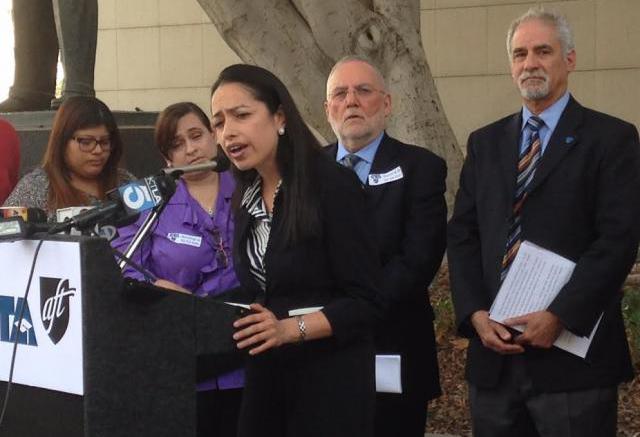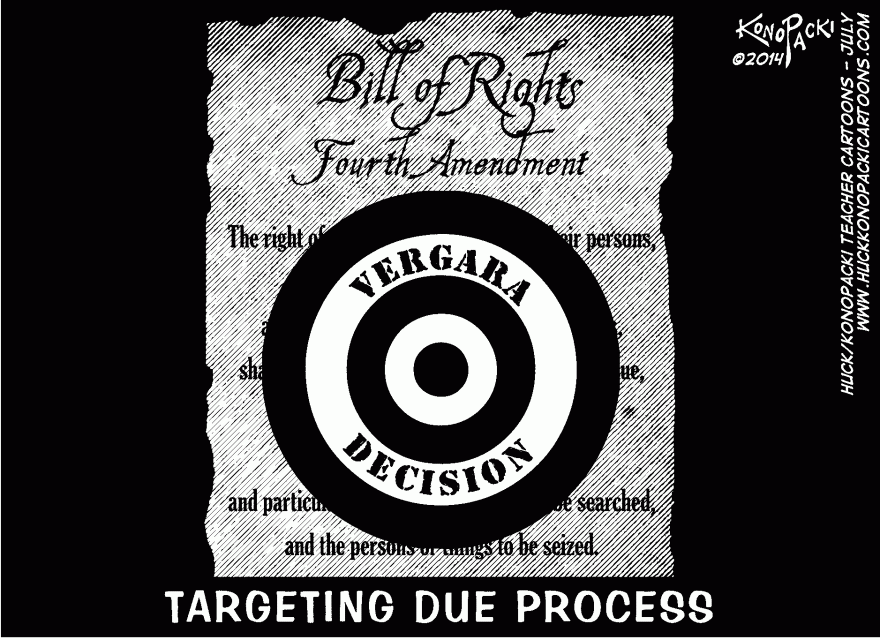Educators applaud Supreme Court ruling in meritless Vergara lawsuit
August 22, 2016 — Statement by CFT
President
“We applaud the state Supreme Court’s affirmation of the appeal
court decision,” said Joshua Pechthalt, president of the
California Federation of Teachers. “The teacher shortage facing
California has been stoked by the Vergara case, the expensive
publicity machine surrounding it, and the constant attacks by
so-called reformers on teachers and public education.
“We can now turn closer attention to solving the actual problems we confront in our schools, such as securing adequate funding through Prop 55, reducing class sizes, promoting and strengthening peer assistance and review, and reinforcing collaborative district practices with a proven record of success. These efforts will result in a more positive climate to address the teacher shortage crisis, bring young people to teaching and encourage experienced teachers to stay in the classroom.”
Appeals court overturns Vergara lawsuit
April 14, 2016
LOS ANGELES — In a sweeping victory for students and educators,
the California Court of Appeal today reversed a lower court
decision in the deeply flawed Vergara v. California lawsuit. The
unanimous appellate opinion is a stinging rebuke to Judge Rolf M.
Treu’s poorly-reasoned ruling, and to the allegations made and
millions of dollars spent by wealthy anti-union education
reformers” to bypass voters, parents, and the legislature with
harmful education policy changes. The reversal affirms the
arguments of educators, civil rights groups, legal scholars and
education policy experts that the state statutes affirming
educator rights do not harm students. Read
the press release.
Amicus briefs spotlight harm to students of Vergara suit
September 16, 2015
LOS ANGELES — Some of the nation’s top legal scholars, education
policy experts, civil rights advocates, award-winning teachers,
school board members and administrators filed five amici curiae,
or “friend of the court” briefs with the California Court of
Appeal today. They shine a spotlight on the numerous and major
flaws that would harm students in last year’s decision striking
down important due process rights for California educators, as
well as other laws governing hiring and layoffs of state
educators. Read
the press release.
Amicus Briefs
- AFT
- NEA
- Unions
- School board officials
- Award-winning teachers
- Educational scholars
- Civil rights organizations
- Constitutional law professors
- Appendix
Background about Vergara v. California
“It would be very scary to me, if this lawsuit succeeds, to think that I might not have a job next year, not for anything I’d done in the classroom, but because my principal didn’t like me, or my clothing, or something I’d said.” — Laura Lacar, Gahr High School, ABC Unified School District
In 2012 a group calling itself “Students Matter,” funded by David Welch, a conservative Silicon Valley millionaire, filed a lawsuit, Vergara v. the State of California. The lawsuit challenges a number of constitutional rights for California’s teachers, including “tenure,” due process rights, and seniority rights during layoffs. The suit, hiding behind a group of students, alleges that these teacher workplace rights infringe the constitutional right of students to an equal education. CFT and CTA joined the defense in 2013, challenging Vergara as a “…meritless lawsuit by corporate special interests attacking teacher professional rights.”
See what EC/K-12 Council President Gary Ravani has to say about the civil rights rhetoric used by Students Matter, and see CFT President Joshua Pechthalt’s op-ed piece in the San Jose Mercury News.
The lawsuit ignores the real problems of public education
Education Code rules to protect teacher rights from administrative mismanagement are not “unfair” to either students or new teachers. What harms students? Economic inequality, poverty, their parents’ joblessness, and underfunding are unfair to students. But this lawsuit ignores these barriers to educational success. The premise of “Vergara” is that public schools are failing, and bad teachers are the reason why. Get rid of the “bad teachers,” and the schools will succeed. This simplistic idea is wrong in a number of ways. Most public schools are successes, by most reasonable measures; and while the role of the teacher is always an important in-school factor, external factors like poverty and underfunding have the greatest impact.
Stripping teachers of their workplace professional rights will harm, not improve, student learning
Anti-public education “reformers” are forever repeating that rules and regulations make it impossible to fire “bad teachers.” Here are the facts. During the first two years of a teacher’s career, a lengthy probation period, administrators can fire them for any reason, or for no reason at all. After that, the requirements are for the administrator to document the problem necessitating the teacher’s dismissal, and convince two out of three people on a panel of experts to agree. That’s it. A teacher’s simple right to a hearing before dismissal is not unfair to students. To the contrary: students need a stable, experienced teaching workforce, not a revolving door of educators.
This attack on the teaching profession will make it harder to attract and retain quality teachers
Attracting and retaining teachers has always been one of the biggest problems in the field of education. Teaching is a difficult, underpaid, and too often undervalued profession – and recent attacks like “Vergara” have only worsened these problems. Most teachers leave the field within the first five years. We need to be encouraging teachers to enter the profession and stay—not demonize them. The laws targeted in this case provide due process when a teacher is accused of misconduct or poor performance, and objectivity in times of layoff. These laws benefit the education system as a whole.
“Tenure” protects academic freedom
The right to a hearing before dismissal (what people call “tenure”) became law through the understanding that political pressures and arbitrary actions of administrators could and often did destroy academic freedom: the right to teach to academic standards and curriculum in a balanced fashion, with all points of view aired, rather than through one viewpoint. The need for academic freedom, and therefore for “tenure,” was demonstrated repeatedly, for instance, during the McCarthy era. Note also the case of Sal Castro, an historic figure who advocated for ethnically relevant courses for Latino students in Los Angeles in the 1960s. The district dismissed him essentially for being an advocate for students and he was only able to get his job back when the community organized for mass actions and took over the school board to get him reinstated. Educators play a special role in a democratic society in challenging assumptions and raising difficult questions. This is not true in many countries where the state dictates all.
Seniority is transparent and fair, and not the reason why layoffs occur
Another wrong premise is the assumption in “Vergara” that seniority order dismissal during layoffs means bad teachers are kept while good teachers are dismissed. The problem with layoffs is not seniority. The problem is the underfunding that causes the layoffs — lack of revenues, exacerbated by the ongoing aftereffects of the economic recession. It is more accurate to say low tax rates on the rich has caused our funding crisis for public education, hence layoffs, then to pretend that orderly dismissal rules are “unfair” to new teachers.
Seniority is the only fair, transparent way to administer layoffs. It ensures equal treatment for all teachers. It replaces the arbitrary authority of administrators to rule by whim. Research consistently shows more experienced teachers provide better student learning outcomes than inexperienced teachers. But we all know schools need a mix of younger and more experienced teachers. Younger teachers bring energy and the most recent pedagogy. Older teachers bring wisdom, the knowledge that comes with facing and solving many classroom problems over the years.
The wealthy backers of this suit are not pro-public education; they are anti-union
The funders of “Vergara” do not fit any pro-public education or pro-civil rights profile we know about. They are using civil rights rhetoric to achieve their goal of destroying teacher rights. But look at who they are, and their track record. The backers of this lawsuit — especially David Welch, a charter school entrepreneur—include a who’s who of the usual anti-union, anti public education suspects (Parent Revolution, Eli Broad) funded by the billionaire’s club and their Astroturf front groups. They are really good at coming up with fair-sounding names, like “Students Matter,” or “Students First,” which however mask a privatizing, union busting agenda. None of these people or organizations were anywhere to be seen during the campaign to pass Prop 30, which, by filling in part of the hole ripped in education funding over the years, stopped layoffs this year, and did more to support equal access to education for all students than anything proposed in this lawsuit.
IN THE MEDIA — A CHRONOLOGY
- Joint CFT/CTA press release, August 22, 2016
- Answer to Petition for Review of Intervenors-Respondents CFT/ CTA, June 13, 2016
- Appellate Court decision overturning Vergara Lawsuit, April 14, 2016
- California Educators Appeal Decision in Meritless Vergara Lawsuit, CFT/CTA Press Release, February 25, 2016
- News Conference Prior to Oral Arguments in Appeal of Flawed Vergara Ruling, CFT/CTA Media Advisory, February 23, 2016
- “AAUP Joins Amicus Brief in Vergara Case,“ The Academe Blog, September 17, 2015
- Civil rights groups, researchers, legal scholars, and top educators urge reversal of deeply flawed Vergara Ruling, CFT/CTA Press Release, September 16, 2015
- CFT/CTA Appeal Brief, May 1, 2015
- Educators Appeal Deeply Flawed Vergara Ruling, CFT/CTA Press Release, May 1, 2015
- California Educators Appeal Decision in Meritless Vergara Lawsuit,, September 3, 2014
- Judge’s final “Vergara” ruling an attack on teachers, Education unions to appeal, August 28, 2014
- “Fact-Checking Campbell Brown: What she said, what research really shows,” Washington Post, August 3, 2014
- “Vergara vs. California: Are the top 0.1% buying their version of education reform?”, Washington Post, June 23, 2014
- “Erwin Chemerinsky: Scapegoating California teachers”, Orange County Register, June 25, 2014
- “More on Vergara: What Does it Actually Cost to Terminate a Teacher?“, Academe Blog, June 17, 2014
- “Bizarre ruling on tenure: Opposing view,” USA Today, June 16, 2014
- “The Vergara Decision and the Threat to Tenure,” Academe Blog, June 6, 2014
- “Vergara lawsuit seeks to damage teaching,“ San Francisco Chronicle, March 23, 2014
- “Our kids deserve much better,” Orange County Register, March 12, 2014
- “A Great Divide: The Election Fight for California’s Schools,” Capital & Main, March 6, 2014
- “The Education of Ted Mitchell,”Capital & Main, February 27, 2014
- “A deeply misguided lawsuit about teachers and students,” Washington Post, February 21, 2014
- David Welch: The Man Behind Vergara v. California, Capital & Main, February 20, 2014
- Children Last: California Trial Showcases the Corporate War on Teachers and Public Education, Huffington Post, February 19, 2014
- “Astroturf Vergara lawsuit just an attempt to dismantle teachers’ rights,” San Jose Mercury News, February 12, 2014
- “Why is Ted Mitchell’s Nonprofit Pushing Vergara v. California?,” Capital & Main, January 30, 2014
- Statement from CFT President Josh Pechthalt on Vergara case, January 30, 2014
- Joint CFT/CTA press release at beginning of Vergara trial, January 27, 2014
- “Vergara Trial targeting teachers’ rights opens,” Capital & Main, January 24, 2014
- “Why a ‘nice philanthropist’ takes on “bad” teachers—and the rest of us,”Huffington Post, January 23, 2014
- “Declaring War on Teachers’ Rights Won’t Improve Children’s Access to a Sound Education,” EdSource, January 22, 2014
- “Education policy via Litigation,”InterACT, June 3, 2013
- “Unexpected Benefits: A Defense of Teacher Tenure,” Education Week, October 5, 2011



